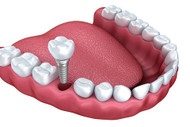How long do dental implants hurt?
When it comes to dental implants, one of the most common questions people have is how long it will take for the implant to stop hurting. In this blog post, we'll explore how long it takes for an implant to heal and what you can do to speed up the healing process. We'll also discuss some of the reasons why an implant may hurt in the first place. If you're considering getting a tooth implant, be sure to read this post.
Is it painful to have dental implants?
Because dental implant surgery is performed under anesthesia, you should not experience any discomfort. This will include local anesthesia and sedation or general anesthesia if necessary. Before surgery, your oral surgeon will discuss anesthesia options with you.
After a dental implant, there may be some discomfort.
You'll probably experience pain or discomfort, but it shouldn't last more than a few days.
The local anesthesia from the procedure will eventually wear off and the pain may become more intense at that time. Most likely, the pain will be felt only in the area around the dental implant site.
Following dental implant surgery, you may experience the following symptoms:
- Swelling around the gums and face due to bleeding at the surgery site
- Jaw pain
- Minor bruising
Your oral surgeon will give you after-surgery instructions to help you manage and reduce pain.
- Prescription and over-the-counter (OTC) medications for pain avoidance of certain foods, such as hard and hot foods, are examples of post-procedure care.
- Instructions on how to care for the surgical site ice packs to reduce swelling rest on the day of the procedure and possibly in the days following, depending on how you feel
How long should pain and discomfort last after a procedure?
Any pain experienced after a successful dental implant procedure should be temporary if everything heals appropriately. After the procedure, you may experience pain for 3 to 5 days. It's possible that you'll only need pain medication for one or two days.
If you feel up to it, you may be able to resume normal activities the next day after the procedure.
A variety of factors can cause throbbing pain after a dental implant procedure.
After a dental implant procedure, it's unusual to experience throbbing pain for an extended period of time. As the anesthesia wears off, you may experience more intense pain for a few hours after the procedure, but this should subside with pain medications and time.
After the procedure, you may develop a complication that causes additional pain. Your oral surgeon or dentist should evaluate these situations right away.
What should you do if you experience pain months or years after receiving a dental implant?
Because of implant failure or peri-implant diseases, you may experience pain near your implants months or years after surgery.
Implants are, for the most part, a highly effective and reliable source.
It could be a sign of implant failure if you experience pain when pressing or tapping on your implant site. Other signs and symptoms of implant failure are:
- Implant's horizontal movement
- Bone loss
- Inflammation
- The oral surgeon's or dentist's inability to attach a crown to the rod
If any of the following apply to you, you may be at a higher risk of implant failure:
- In your mouth, bacteria grow.
- You smoke.
- You have untreated diabetes.
- You have had gum disease or periodontitis in the past.
If you don't take care of your replacement teeth, you may experience pain near your dental implant.
Dental implants, like natural teeth, require proper hygienic care. Brushing and flossing your teeth on a daily basis, as well as visiting your dentist for regular cleanings every six months, are all part of this routine.
The peri-implant disease can develop if oral hygiene is neglected. Bacteria build-up in the tissue surrounding your implants causes this. Inflammation, tissue damage, and bone loss are all possible outcomes.
When these conditions only affect the soft tissue in your mouth, you may be able to treat them. However, if the condition breaks down the bone beneath the implant, you may need reconstructive surgery.
Clip On Veneers are a dental implant alternative
For people who are not candidates for dental implants or not interested in having a dentist working inside their mouth, clip-on veneers are an excellent alternative to dental implants.
Clip on veneers are a great way to improve your smile without dental implants.
They are also a good option for people who have sensitive teeth and gums, as there is no drilling or grinding involved in the process.
Takeaway
If you get dental implants, you should expect some discomfort. Medication can help with this pain, and it will get better over time.
Pain that persists or worsens could indicate a complication. If you're still in pain or experiencing discomfort after your procedure after more than 5 days, call your doctor.
You can avoid the pain of dental implants altogether with clip-on veneers.
Frequently Asked Questions
What Are Dental Implants and How Do They Work?
Dental implants are prosthetic teeth that are surgically placed in areas where a tooth or teeth are missing. These are artificial substitutes that look and work like the real thing. You can get dental implants if you have teeth that have been damaged or if you don't have any at all.
One advantage of dental implants is that they eliminate the possibility of cavities. The material protects your bone and keeps it from deteriorating further. It also lasts a long time. You can choose between removable and fixed implants.
What Are the Causes of Dental Implant Issues?
You should not drink or smoke before or after getting a dental implant. It reduces the amount of blood flow to your gums, slowing the healing process.
Consult your doctor and dentist if you have autoimmune diseases such as diabetes or arthritis. You may experience slow healing and implant failure as a result of your medications.
The longevity of your implants is influenced by your ability to maintain good oral hygiene. Flossing should be done on a regular basis to remove plaque and food stuck between your teeth. Clean your teeth thoroughly to prevent infections from spreading throughout your body.
What can I do to make dental implants less painful?
Pain management largely depends on closely following your dentist's post-operative instructions and providing excellent dental implant aftercare. You can do a few other things to help alleviate any pain from implant placement.

 UK
UK
 USA
USA
 Australia
Australia

